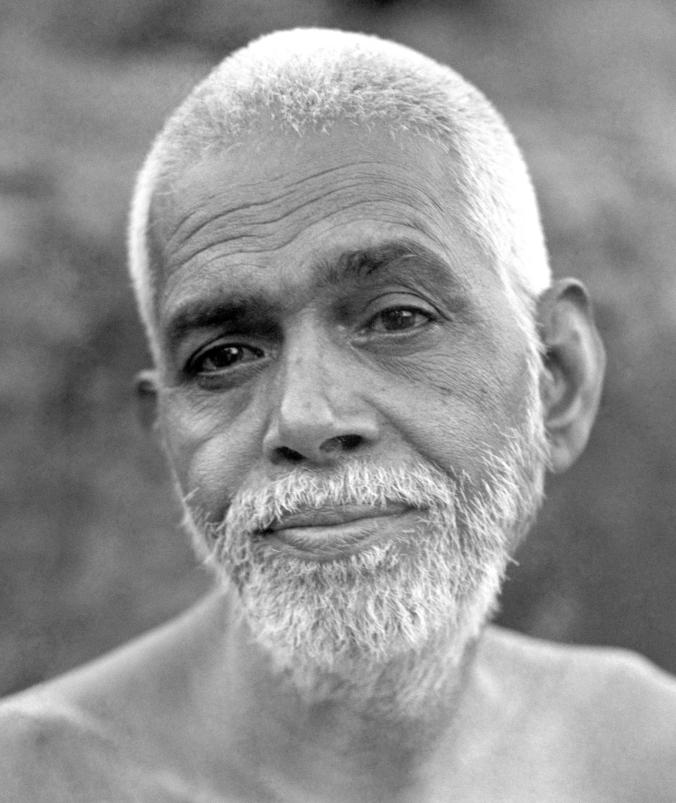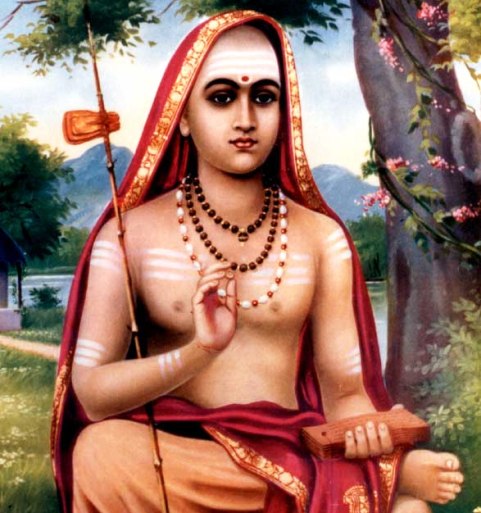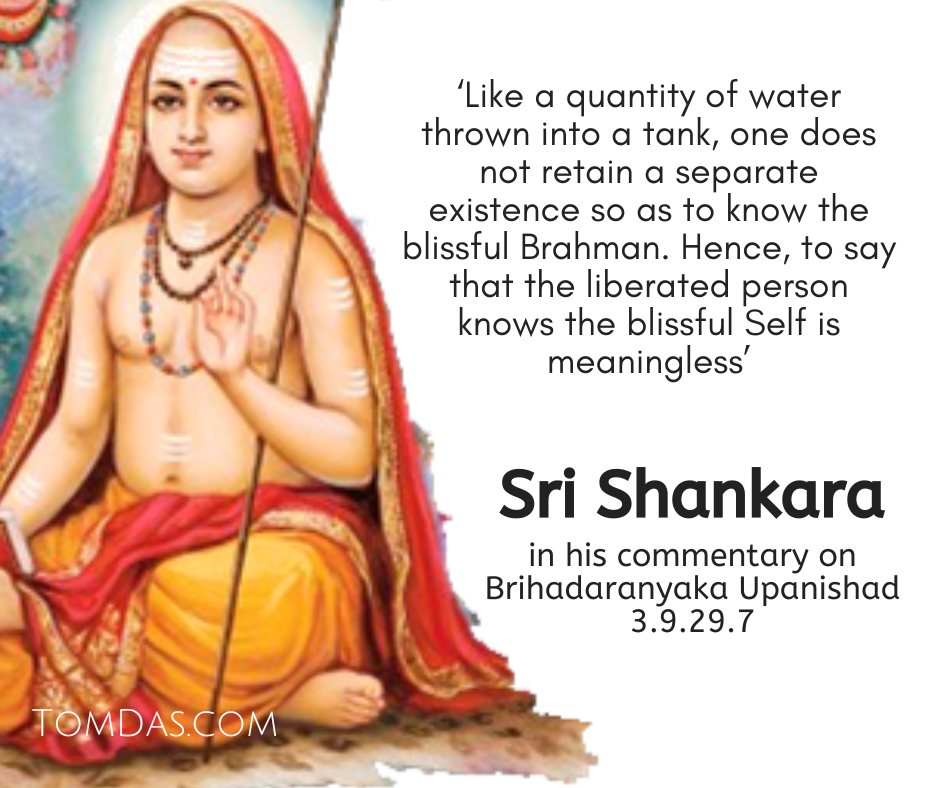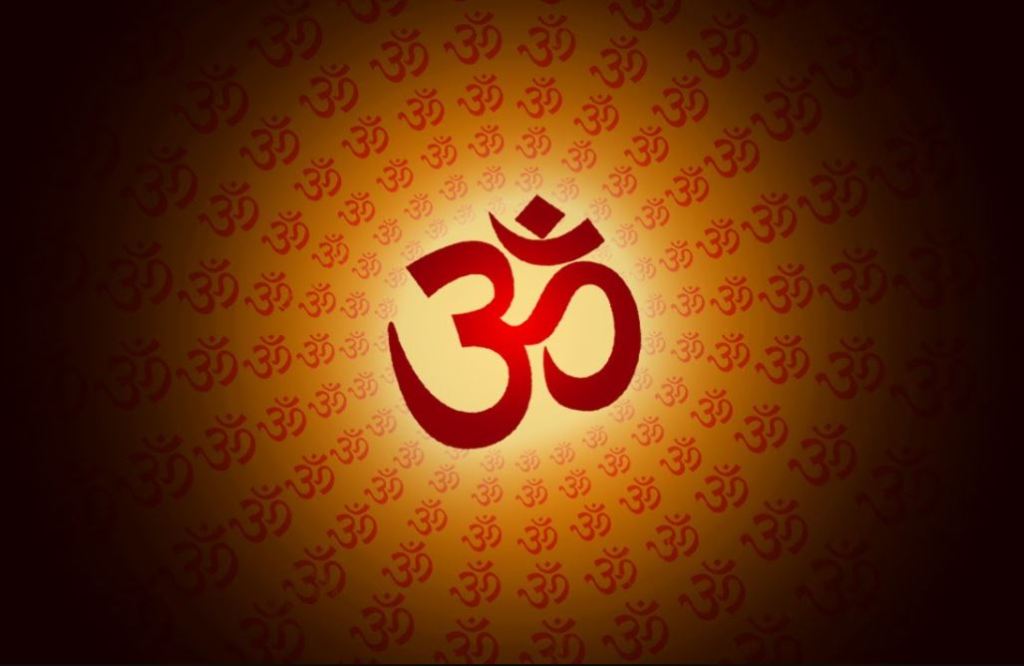self-knowledge
Shankara: Absolute separation from the body is liberation | Bliss (Ananda) and the Self | Advaita Vedanta | Commentary on Upanishads
Tom: Shankara writes the following in his commentary of Brihadaranyaka Upanishad 3.9.29.7. My comments are interspersed in italicised red with Shankara’s writings in black.
Here Shankara is making the point that strictly speaking there is no knowing or knowledge in Self-Knowledge/Self-Realisation/The Self, meaning there is no existence of or involvement of the mind in Self. He gives the analogy of water being thrown into a larger tank of water – that initial water does not retain its separateness by which it can know the larger body of water into which it was thrown. Self-knowledge is just a phrase used to point to That which cannot be put into words.
If there was an entity that could know Brahman or know of Brahman, then that would imply 2 entities, Brahman and and knower of Brahman. Or it would imply differentiation of Brahman. Either of these would contradict shruti (revealed scripture/revealed knowledge).
Similarly, Shankara states that bliss is not cognised in Self-Realisation for the same reasons. Rather Bliss is the nature of Self, not something experienced by the Self or by some self-realised entity or person (which is another illusion).
Incidentally, Shankara also reveals just how radical liberation is, stating that in liberation there is no body, no organs, no mind, no knowledge:
Also see: What exactly is Jnana (knowledge) according to Shankara and Gaudapada and the scriptures?
[Shankara:] Absolute separation from the body is liberation, and when there is no body there can be no organs, for they will have no support . Hence too there will be no knowledge, there being no body and organs. If knowledge could arise even in the absence of the body and organs, there would be no necessity for any one to possess them. Moreover (if Brahman as Knowledge Absolute cognises the bliss in liberation), it will contradict the oneness of Brahman.
Tom: Shankara clearly states in liberation there is total or absolute separation from Body, and then says there is no body in liberation. Without a body, there can be no mind and without a mind there can be no cognition or knowledge (in the ordinary sense of these words).
We see similar teachings from Sri Ramana Maharshi: in Ulladu Narpadu verse 12, Sri Ramana Maharshi writes:
True Knowledge is Being, devoid of knowledge as well as ignorance of objects. Knowledge of objects is not true knowledge. Since the Self shines self-luminous, with nothing else for It to know, with nothing else to know It, the Self is Knowledge. Nescience [ignorance] It is not.
In Upadesa Saram verse 27, Sri Ramana Maharshi writes:
That is true knowledge which transcends
Both knowledge and ignorance,
For in pure knowledge
Is no object to be known.
OBJECTION: Suppose we say that the Supreme Brahman, being eternal Knowledge, ever knows Itself as Bliss Absolute?
REPLY: No, (this has just been answered). Even the person under bondage, when freed from relative existence, would regain one’s real nature (Brahman). (So the same argument would apply also) .
Like a quantity of water thrown into a tank, one does not retain a separate existence so as to know the blissful Brahman. Hence, to say that the liberated person knows the blissful Self is meaningless. If, on the other hand, the liberated one, being different from Brahman, knows the bliss of Brahman and the individual self as, “I am the Bliss Absolute”, then the oneness of Brahman is contradicted, which would be against all Srutis; and there is no third alternative.
Tom: See my explanation in the introduction above
Moreover, if Brahman ever knows Its own bliss, it is superfluous to distinguish between awareness and unawareness. If It is constantly aware of this bliss, then that is Its nature; hence there is no sense in maintaining that It cognises Its own bliss.
Tom: the point here is that if Brahman is ‘constantly aware of it’s own bliss’, then this bliss is simply the nature of the Self, as Self is One, and it doesn’t make sense to think of an entity that cognises or perceives bliss in some way in Self-Realisation.
Such a view would be tenable if ever there was the possibility of Its not knowing that bliss, as for instance one knows oneself and another (by an act of will). There is certainly no sense in distinguishing between a state of awareness and one of unawareness in the case of one whose mind is uninterruptedly absorbed in making an arrow, for instance.
Tom: Shankara’s argument here is saying that to speak of ‘constantly knowing bliss’ during self-realisation would only make sense if there would be a possibility of not knowing bliss during self-realisation, which is not possible, so again, bliss is the nature of Self and not a cognised object.
If, on the other hand, Brahman or the Self is supposed to be knowing Its bliss interruptedly, then in the intervals when It does not cognise Itself, It must know something else; and the Self would become changeful, which would make It non-permanent.
Tom: If the bliss of Brahman came and went, or increased and decreased, then that would mean the Self is subject to change (which it isn’t) and is therefore impermanent (which it isn’t).
Hence the text, ” Knowledge , Bliss “, etc, must be interpreted as setting forth the nature of Brahman, and not signifying that the bliss of the Self is cognised.
Tom: Regarding the initial statement of Shankara’s above, namely that there is no body in Liberation, here are some quotes of Sri Ramana Maharshi’s that say the same, taken from Guru Vachaka Kovai:
86 Don’t ask, “How did this error rise,
Why this ignorance that the Self
Itself is as the world transformed?”
Seek rather and find out to whom
This happened, and the error [Tom: of the world appearance] will
Persist no more.
87 What is the Self’s self-transformation
As the world? A coil of straw
Appearing as a snake? Look hard,
You see no snake at all. There is
No transformation, no creation, none,
No world at all. [Tom: ie. ajata vada]
97 Only the mind, by maya’s might
Deluded, and looking outward sees
The body. The true Self knows no body.
To call the Self of Pure Awareness
The body’s owner or indweller
Is an error.
[Tom: This is reference to Chapter 13 of the Bhagavad Gita where Krishna states the Self is the knower of the body, and various other scriptures which advise that the Self is somewhere deep within the body, dwelling in each and everyone’s body, here Bhagavan Ramana is saying even this is not true, pointing us to a deeper teaching]
1230 The things you think of as existing
Do not exist. But That of which
You know not if it does exist
Or does not [Tom: ie. the supreme birthless deathless unchanging ever-pure blissful Self], That alone exists.
First know who you are. This requires no sastras (scripture) or scholarship | Sri Ramana Maharshi

First know who you are. This requires no sastras (scripture) or scholarship. This is simple experience. The state of being is now and here all along. You have lost hold of yourself and are asking others for guidance. The purpose of philosophy is to turn the mind inward. “If you know yourself, no evil can come to you. Because you asked me I have told you this” (see Kaivalya Navaneeta). The ego comes up only by holding you (the Self). Hold yourself and the ego will vanish. Until then the sage will be happy saying, ‘There is’, and the ignorant will be asking, ‘Where?’
Regulation of life, such as getting up at a fixed hour, bathing, doing mantra-japa, etc., all this is for people who do not feel drawn to Self-enquiry, or are not capable of it. But for those who can practise this method all rules and disciplines are unnecessary.
Undoubtedly it is said in some books, that one should go on cultivating one good quality after another and thus prepare for moksha; but for those who follow the jnana or vichara marga, their sadhana is itself quite enough for acquiring all daivic (divine) qualities; they need not do anything else.
What is Gayatri? It really means ‘Let me concentrate on That which illumines all’.
~ Gems from Sri Ramana Maharishi, Chapter 4
There is no Duality in Non-duality | Self-knowledge
[Sri Ramana Maharshi writes in] Upadesa Undiyar verse 26, “Being Self is itself knowing Self, because Self is that which is devoid of duality…“.
Therefore it follows that the very nature of Self is itself knowledge, though it is a knowledge which is devoid of the act of knowing.
That is why Sri Bhagavan says in verse 12 of Ulladu Narpadu, “ … That which knows cannot be [true] knowledge … “.
The same truth is also expressed by Sri Muruganar in verse 831 of Mey Tava Vilakkam, where he says, “The real ‘I’ is such a knowledge which knows neither other things nor itself”.
Since Self-knowledge is non-dual, it is a knowledge which shines without the triad [triputi] – the knower, the act of knowing and the object known – and hence it is quite different from other kinds of knowledge, all of which involve the act of knowing.
~ Sri Sadhu Om, commentary on Guru Vachaka Kovai verse 1038
Conscious sleep (Jagrat Sushupti) is Self-knowledge | Sri Ramana Maharshi | Guru Vachaka Kovai
959. O men who, caught by the dangerous snares of the world and struck by the sharp arrows of cruel miseries, are suffering greatly and are wandering in search of the attainment of supreme bliss, the sleep in which there is no loss of consciousness [i.e. wakeful sleep or jagrat-sushupti] alone is the imperishable happiness.
~Sri Ramana Maharshi, Guru Vachaka Kovai
Commentary by Sri Sadhu Om:
”The sleep in which there is no loss of consciousness’ [arivu-azhiya tukkam] means only the state of Self-knowledge.
‘Here consciousness [arivu] means prajna or the knowledge of one’s own existence, and not the knowledge of other things.
‘That which knows other things is not true knowledge [see Ulladu Narpadu verse 12]. The state we call sleep is the state in which we know no other things, not even the body.
‘The state we call waking is the state in which, along with the knowledge of one’s own existence [‘I am’], there is also knowledge of other things.
‘The state in which we remain conscious merely of our own existence, like in waking, but in which the mind [the knower of other things] does not rise, like in sleep, is called the state of conscious sleep or wakeful sleep.
‘Since no other thing is known in this state, it is a sleep; and since one’s own existence is shining clearly there, it is a state of consciousness or waking.’
960. Those who are sleeping, having given up the habit of [going out through] the deceitful senses and having become established in the heart-lotus, are those who are awake in the abode of real knowledge [mey-jnana]. Others are those who are asleep, being immersed in the dense darkness of this unreal world [poy-jnala].
~Sri Ramana Maharshi, Guru Vachaka Kovai
What happens to the mind whilst realising the Self? | Clarity of mind during realisation | Maya
Everyone has Self-Knowledge, the Self is ever-realised | Sri Ramana Maharshi
Everyone has self-knowledge. Self knowledge is the Self. They are one and the same. Sri Ramana Maharshi says in Talks, no 280:
‘There is no moment when the Self is not nor when the Self is not realised.’
and
‘Even now you are Self-realised.’
The problem is ignorance, meaning thinking you are the body-mind entity. Both thinking and the body-mind themselves are mere superimpositions.
When this ignorance/superimposition has been removed, then only the Self remains. That is called Self-knowledge or the Self. Sri Ramana says in Talks 462:
‘Being the Self one remains always realised, only be free from thoughts [Tom: ie. superimpositions].’
And in Talks 490:
‘The Self is always realised. But only you do not recognise the fact. The Realisation is now obscured by the present world-idea.[Tom: ie. superimposition of the body-mind-world]’
This Self-knowledge is not knowledge in the mind, which is something that comes and goes, and this Self-Knowledge is not for the body-mind at all.
It is described as being unborn and eternal by the great sages. It cannot be taught, only obstacles (ie. ignorance) is to be removed by turning within. Sri Ramana Maharshi says in Talks 282:
‘The Guru does not bring about Self-Realisation. He simply removes the obstacles to it. The Self is always realised.’
And in Talks 164:
‘Seek within. The Self is always realised.’
And talks 490 this same point above in made again, but the importance of the desire for liberation is also stated by Bhagavan:
‘The Self is always realised. The Realisation is now obscured. When the veil is removed the person feels happy at rediscovering the ever-realised Self. The ever-present Realisation appears to be a new Realisation. Now, what should one do to overcome the present ignorance. Be eager to have the true knowledge. As this eagerness grows the wrong knowledge diminishes in strength until it finally disappears.’
May we be desirous of Self-Realisation, that Realisation which ever-is.
May we be blessed by Sri Ramana’s Grace and Presence, that is our very Own Self.
May be receive the True Teaching that is created by our own Desire (for Liberation)
Om Shanti Shanti Shanti
Fear of Disappearing, ‘No free will’, Science & Faith | Intuitive Self-Knowledge | Ramana Maharshi | Advaita | Non-duality
Is the Self a witness? Or is it everything? Or both? How to realise the Self? Advaita Vedanta | Atman | Self-Realisation
Also see: Recommended Reading: Books for Enlightenment, Liberation and Self-Realisation
Question: Hi Tom, it is often said that the Self is the Witness, meaning that which sees or perceives all objects. In other places it is said the Self is everything. I’m not sure what to make of this. Can you give me some clarity please?
Tom: Hi, yes, this can cause lots of confusion for many. Even many Vedanta teachers do not really understand this point. As ever, Bhagavan Sri Ramana Maharshi points us to the true vedanta, the truly liberating way, in his teachings.
In truth the Self is not a witness at all, but as long as we think we are a body-mind entity, and as long as we see a world outside of or apart from ourself, the Self is indicated or pointed out as being the Subject or the Witness.
When in Self-Enquiry (the path of Knowledge) we turn our attention away from the objects, which means the various gross and suble phenomena that are perceived, and towards the Subject or Self (‘Witness’), eventually the ego-mind which takes itself to be a body-mind entity dissolves or dies and all that is left is the Subject-Witness-Self. This Self can no longer truly be said to be either a Subject (for there are no objects present), nor can it be said to be a Witness, as there is nothing to witness. It is All, it is the Sole Reality, ‘One without a second’, as it is often described as being in the Upanishads.
This teaching is explained in detail in The Path of Sri Ramana and Sadhanai Saram (the essence of spiritual practice)
Q. Why then is the Self said to be a witness at all?
Tom: it is only to point out where to direct your attention towards. That apparent Subject, the I AM is what we truly are and all there truly is. All else is illusion, maya. The problem is that we think that we are the body-mind, which is actually a part of maya. Only through Self-Knowledge can we realise what we truly are, and to that end the Self is pointed out as being a Witness or being the Subject. Why? So we can turn towards it and thereby realise our/the Self.
Q. Why then is the Self said to be everything?
Tom: When we are under the spell of illusion, meaning when we take ourself to be a body-mind entity living in an apparently external world, we can say that everything is the Self, that all comes from the Self, and the Self pervades all. What can be apart from the Self? Nothing! However, at this point, we are still under the spell of illusion or maya or ignorance (all are synonyms). When, through self-enquiry, we discover the Reality, our Self, as it truly is, there is no Maya/ignorance/illusion at all and we realise there never was ever any illusion/ignorance at any point in time ever (actually we also realise there was never any time either, which is simply a part of the illusion). This is the Self. This is self-realisation.
There is actually no realisation of anything in self-realisation, for realisation implies a mind that realises something, and neither the ‘mind’ nor ‘something’ are in the self, both being aspects of Maya (illusion). There is only the Self.
Q. So does the Self pervade everything, all objects?
Tom: Why worry about objects, maya? The ego-mind is always concerned about maya. Discover the Self and find out! You will no longer be interested in maya (ie. there is/will be no maya in realisation). To discover the self, consider all objects to be maya and turn your attention lovingly towards the Subject, the I AM, what you actually are
Renouncing this phenomenal world
Which seems to, but does not, exist
We gain (the great ones say) the Self,
The Awareness shining all unseen.
Sri Ramana Maharshi, Guru Vachaka Kovai, Verse 835
Q. Why in some places does it say objects are not-Self and in other places it says objects are Self?
Tom: Contrary to what many think it is the lower teachings that say all is Self, to convince the seeker that there is only the Self. The higher teachings say that objects are not-Self, ie. maya or illusion, thus encouraging the sincere seeker to turn away from objects towards the Subject, whose true nature is Eternal Love and Bliss. The Eternal and Blissful nature of the Self is seemingly lost due to pre-occupation with the dream-like maya. Therefore the only way out is to attend to the Eternal and discover what you truly are!
Note that in both cases, whether you consider objects to be the Self or non-Self, that is a conceptual position for the mind. And liberation has nothing to do with the mind, the mind itself being ignorance.
Q. Don’t the scriptures state that the mind leads the way to liberation? Isn’t the way to liberation through knowledge, as isn’t knowledge to do with the mind?
Tom: It is true that some scriptures say that through the mind we can reach liberation. That means that it is the mind that hears the teachings (sravana), reflects upon them (manana), and then this naturally leads to meditation upon the Self (Self Enquiry or Nididhyasana) which in turn leads to manonasa (destruction of mind, or destruction of ignorance) which is the same as liberation (Mukti or Moksha), which is also the same as Jnana (knowledge) or Atma Jnana (Self-knowledge).
In Self knowledge, there is only the Self. There is no mental knowledge in Jnana at all, Jnana or Knolwedge just being another name for the Self. See here for more on this:
What is true Wisdom? What is Jnana? Sri Ramana Maharshi (Upadesa Saram)
Q. So in that case does that mean that all we have to do for realisation is to remain as the witness, watching phenomena as they come and go?
Tom: No, that is not correct at all. Whilst remaining as the witness is a lovely teaching in many ways that can be a wonderful practice for some people at some points on their journey, merely remaining a witness is (1) not liberating and (2) is also not possible for most, as the mind keeps on getting drawn back into thoughts of body, mind or world. Merely remaining as the witness to objective phenomena as they come and go is merely attending to maya, as all objective phenomena are maya, and so the ego-illusion and suffering continue. For realisation, we must attend to the Subject-Self, the I Am, until the ego-mind (which is duality) is no more, ie. until self-realisation, ie. until be discover what we truly are.
For more see here: In Brief: how to attain Liberation and HOW TO END EGO-SUFFERING (and why other spiritual paths tend not to ultimately work
If you refrain from looking at this
Or that or any other object
Then by that overpowering look
Into absolute Being you become
Yourself the boundless space of pure
Awareness which alone is Real Being.
Sri Ramana Maharshi, Guru Vachaka Kovai, Verse 647
Question: What is it that discovers the Self?
Tom: There is no entity that discovers the Self. It is only the Self that ‘discovers’ the Self. It is the total absolute removal or total absense of ignorance. It is merely the Self being the Self, One without and second (maya), no more, no less.


